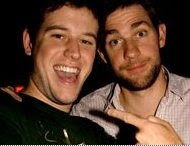 Gran Torino
Gran TorinoDirected by Clint Eastwood
Starring Clint Eastwood
Rated R
Review by Scott Johnson
What if instead of being a cop in San Francisco, "Dirty" Harry Callahan was a retired auto worker in Detroit? That's the question that Clint Eastwood's Gran Torino asks, looking to reconsider the bloodthirsty vigilanteism of the earlier films.
In his review in 1971, Roger Ebert wrote that "if anybody is writing a book about the rise of fascism in America, they ought to have a look at Dirty Harry," and Pauline Kael said it had "fascist potential". Eastwood is too thoughtful a filmmaker to have let these comments go unnoticed, even nearly four decades later. This new film believes that the world is a bit more complicated than Harry saw it, and forced to live in changing times might have given Inspector Callahn a different perspective. This is a noble effort, but unfortunately I think it fails.
Eastwood plays retired autoworker Walt Kowalski. If you were to think that Walt is a bit less violent than Harry, you would be wrong. Walt is a veteran of not only the Korean War but also the auto wars with Japan. He growls and grimaces at his son's Japanese car--and everything else for that matter. This is not a guy with friendly feelings towards anything, especially if it comes from Asia.
Guess who moves in next door? A Hmong (Southeast Asian) family arrives and Walt is none too happy. If you have seen a single commercial for Gran Torino, you will know that a group of Hmong gang-bangers drag the neighboring boy out of his house, resulting in Walt pointing a rifle at them and snarling "Get off my lawn!" In case you didn't catch it, he's an angry old man of the John McCain variety.
This over the top moment is tense but is also clearly played for laughs, along with much of Walt's angry, racist ranting. As a normal, sane person I can appreciate that this is authentic dialogue from this sort of guy--I have known a number of people who speak much the same way. I am even willing to laugh at some of his idiocy since it is so clear that is what it is. However, I think a little of this goes a long way--when Walt is invited over to the neighboring house for a barbecue and thanks them for all their "great gook food," it is just a bit much. This is not authentic--even a guy like Walt would know better than to say something so stupid--and the moment just played for dumb laughs. Worse yet, one of the characters tells Walt that Hmong people usually smile politely when insulting, and unfortunately they do just that after all of Walt's remarks, instead of what they should do, which is rip him a new one. I would like to see Harry/Walt respond to that.
The story itself is a bit tired and predictable--old man meets boy, hates boy, reluctantly comes to like boy, etc. A few of the Asian-American actors do well in their roles but the key characters just don't work. A key actor in a key scene towards the end finds himself in a fit of rage and it is simply unconvincing.
The ending is a bit unexpected--but only a bit--and Walt's ungrateful family is just silly. They do everything they can to not give a damn about this guy and not understand him, so it is no surprise to us in the end when we find that Walt does not give a damn about them. It is, however, all a bit too neat and tidy for a film that is attempting to provide a more complex counter-point to simplistic cop movies where there are clear cut good guys and bad guys. In fact, if the movie were not associated with Eastwood I doubt anybody would give it the time of day. Other than Eastwood's scenery chewing performance there is just not much here.
It is good to see Eastwood attempting to reconsider his past roles and providing a corrective to his legacy, but the story ends up being a bit too simplistic to really be effective towards those ends.





No comments:
Post a Comment